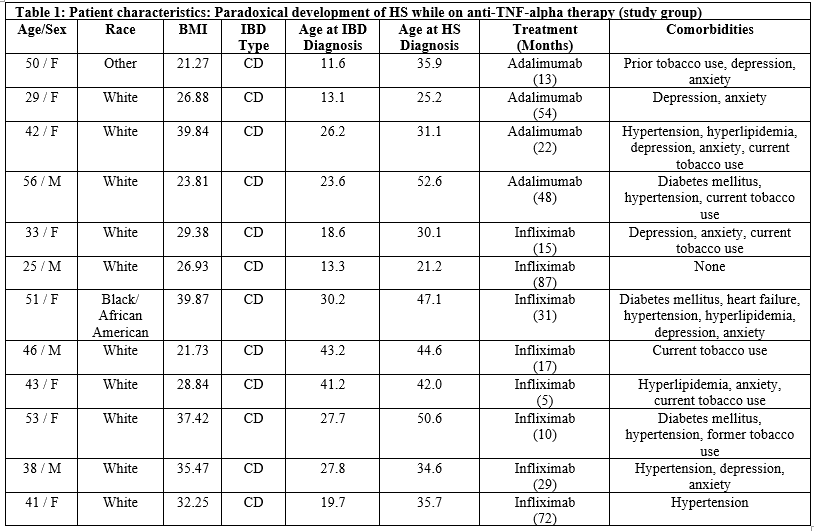Monday Poster Session
Category: IBD
P3236 - Characteristics of Patients With Inflammatory Bowel Disease With Paradoxical Development of Hidradenitis Suppurativa: A Descriptive Analysis
Monday, October 27, 2025
10:30 AM - 4:00 PM PDT
Location: Exhibit Hall
- KS
Katherine Shephard, MD
West Virginia University School of Medicine
Morgantown, WV
Presenting Author(s)
Katherine Shepherd, MD, Khaled Elfert, MD, Anastasia Digman, PharmD, Kanwarpreet Tandon, MBBS, Jennifer Hadam-Veverka, MD
West Virginia University School of Medicine, Morgantown, WV
Introduction: Inflammatory bowel disease (IBD) and hidradenitis suppurativa (HS) are lifelong diseases with a relapsing and remitting disease course. Anti-tumor necrosis factor (TNF)-alpha therapy, specifically adalimumab, is independently approved by the Food and Drug Association for treatment of IBD and HS. In addition, infliximab, a commonly utilized biologic for IBD, has been proposed as a second line biologic agent for HS. Recent literature highlights a paradoxical relationship of patients developing HS while receiving anti-TNF-alpha therapy. We aim to evaluate the clinical characteristics of patients actively receiving anti-TNF-alpha therapy for IBD who subsequently developed concurrent HS.
Methods: Adult patients ( >18 years old) with both IBD (Crohn’s and ulcerative colitis) and HS were identified in the Gastroenterology Clinic at J.W. Ruby Memorial Hospital between January 1, 2015 and August, 31 2024. Patients with IBD who were subsequently diagnosed with HS after starting anti-TNF alpha therapy were isolated. Electronic medical records were used to collect demographic data, time of diagnosis of IBD and HS, comorbidities, tobacco use, and medication history.
Results: A total of 43 patients with IBD and HS were identified. 12 of the 43 patients were diagnosed with HS after receiving anti-TNF-alpha therapy for IBD. Of the 12 patients, 4 (33.3%) were receiving adalimumab and 8 (66.6%) were receiving infliximab treatment at the time of HS diagnosis. The average duration of anti-TNF-alpha therapy prior to developing HS was 33.6 months. 75% of patients were overweight or obese, and 58% had metabolic disease (Table 1). All the patients with paradoxical HS were noted to have Crohn’s disease.
Discussion: Our study identifies and describes the characteristics of one of the largest subsets of patients with IBD on anti-TNF-alpha therapy who paradoxically developed HS. Notably, all patients with the paradoxical relationship had Crohn’s disease. Additional common features included female sex, overweight/obesity, tobacco use, and metabolic disease which are known associations with HS. Further research is needed to identify whether patients have a genetic or clinical predisposition to determine whether this is truly a paradoxical relationship or evolution of a subset of patients with aggressive extraintestinal manifestations associated with IBD.

Figure: Table 1: Patient characteristics: Paradoxical development of HS while on anti-TNF-alpha therapy
Disclosures:
Katherine Shepherd indicated no relevant financial relationships.
Khaled Elfert indicated no relevant financial relationships.
Anastasia Digman indicated no relevant financial relationships.
Kanwarpreet Tandon indicated no relevant financial relationships.
Jennifer Hadam-Veverka: Abbvie – Speakers Bureau. Johnson & Johnson – Speakers Bureau. Takeda – Speakers Bureau.
Katherine Shepherd, MD, Khaled Elfert, MD, Anastasia Digman, PharmD, Kanwarpreet Tandon, MBBS, Jennifer Hadam-Veverka, MD. P3236 - Characteristics of Patients With Inflammatory Bowel Disease With Paradoxical Development of Hidradenitis Suppurativa: A Descriptive Analysis, ACG 2025 Annual Scientific Meeting Abstracts. Phoenix, AZ: American College of Gastroenterology.
West Virginia University School of Medicine, Morgantown, WV
Introduction: Inflammatory bowel disease (IBD) and hidradenitis suppurativa (HS) are lifelong diseases with a relapsing and remitting disease course. Anti-tumor necrosis factor (TNF)-alpha therapy, specifically adalimumab, is independently approved by the Food and Drug Association for treatment of IBD and HS. In addition, infliximab, a commonly utilized biologic for IBD, has been proposed as a second line biologic agent for HS. Recent literature highlights a paradoxical relationship of patients developing HS while receiving anti-TNF-alpha therapy. We aim to evaluate the clinical characteristics of patients actively receiving anti-TNF-alpha therapy for IBD who subsequently developed concurrent HS.
Methods: Adult patients ( >18 years old) with both IBD (Crohn’s and ulcerative colitis) and HS were identified in the Gastroenterology Clinic at J.W. Ruby Memorial Hospital between January 1, 2015 and August, 31 2024. Patients with IBD who were subsequently diagnosed with HS after starting anti-TNF alpha therapy were isolated. Electronic medical records were used to collect demographic data, time of diagnosis of IBD and HS, comorbidities, tobacco use, and medication history.
Results: A total of 43 patients with IBD and HS were identified. 12 of the 43 patients were diagnosed with HS after receiving anti-TNF-alpha therapy for IBD. Of the 12 patients, 4 (33.3%) were receiving adalimumab and 8 (66.6%) were receiving infliximab treatment at the time of HS diagnosis. The average duration of anti-TNF-alpha therapy prior to developing HS was 33.6 months. 75% of patients were overweight or obese, and 58% had metabolic disease (Table 1). All the patients with paradoxical HS were noted to have Crohn’s disease.
Discussion: Our study identifies and describes the characteristics of one of the largest subsets of patients with IBD on anti-TNF-alpha therapy who paradoxically developed HS. Notably, all patients with the paradoxical relationship had Crohn’s disease. Additional common features included female sex, overweight/obesity, tobacco use, and metabolic disease which are known associations with HS. Further research is needed to identify whether patients have a genetic or clinical predisposition to determine whether this is truly a paradoxical relationship or evolution of a subset of patients with aggressive extraintestinal manifestations associated with IBD.

Figure: Table 1: Patient characteristics: Paradoxical development of HS while on anti-TNF-alpha therapy
Disclosures:
Katherine Shepherd indicated no relevant financial relationships.
Khaled Elfert indicated no relevant financial relationships.
Anastasia Digman indicated no relevant financial relationships.
Kanwarpreet Tandon indicated no relevant financial relationships.
Jennifer Hadam-Veverka: Abbvie – Speakers Bureau. Johnson & Johnson – Speakers Bureau. Takeda – Speakers Bureau.
Katherine Shepherd, MD, Khaled Elfert, MD, Anastasia Digman, PharmD, Kanwarpreet Tandon, MBBS, Jennifer Hadam-Veverka, MD. P3236 - Characteristics of Patients With Inflammatory Bowel Disease With Paradoxical Development of Hidradenitis Suppurativa: A Descriptive Analysis, ACG 2025 Annual Scientific Meeting Abstracts. Phoenix, AZ: American College of Gastroenterology.
